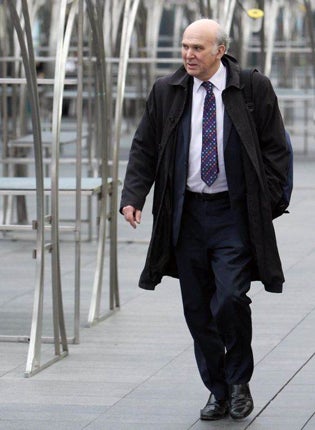Cable prepares to relaunch his career with new war on bankers

Nick Clegg and Vince Cable will demand major reforms of the banks as the Liberal Democrats flex their muscles and adopt a more "arms length" policy from the Conservatives.
After tensions between Liberal Democrat and Tory ministers over the proposed NHS reorganisation and next month's referendum on the voting system, the structure of the banks could be the next battleground between the Coalition Government partners.
Mr Clegg and Mr Cable, the Business Secretary, will press David Cameron to implement in full proposals to restructure the banks to be published on Monday in the interim report of the Independent Commission on Banking chaired by Sir John Vickers, former head of the Office of Fair Trading.
Although the commission may stop short of recommending the full separation of the banks' high street and investment arms, Whitehall officials believe it is likely to propose putting the two functions into different subsidiaries within each bank. The aim of such ring-fencing would be to ensure that taxpayers never have to bail out so-called "casino banking" again.
Such a division could win the support of Mervyn King, Governor of the Bank of England, but Treasury officials are worried that some banks could move abroad if they judge the costs of the restructuring to be excessive. Imposing a costly shake-up on the banks, some Tory ministers believe, could also hinder the Government's efforts to persuade them to lend more to small businesses – dealing another blow to the fragile economic recovery.
Ministers admit that George Osborne, the Chancellor, could face a big dilemma over the report. There have been tensions between them in the past over Mr Cable's determination to rein in the banks.
Senior Liberal Democrats were disappointed that the Chancellor did not take a tougher stance on bank bonuses and say they will not accept any dilution of the Vickers proposals. They say the Government's response must be decided by the full Cabinet and not the Chancellor. But such demands will not please some Tory MPs, who are already accusing the Liberal Democrats of "overplaying their hand" in the run-up to the 5 May elections in English councils, the Scottish Parliament and Welsh Assembly. "They need to remember they have 57 MPs and we have 306," one Tory backbench leader said.
Lord Oakeshott of Seagrove Bay, who resigned as a Liberal Democrat Treasury spokesman after accusing the Government of going soft on bonuses, said yesterday: "Unless we implement Vickers fast and in full, the question will be 'who runs Britain, the Government or the banks?' When you see the banks' power network operating at the heart of Government, you understand why Labour bottled out of radical action to reform our broken banking system, but we must do it."
Lord Oakeshott said that unlike the NHS reorganisation, banking reform would be popular and fair: "We will never get our banks doing their essential job of lending to small business to create jobs, and to homebuyers without a 20 or 30 per cent deposit, until we split off their gambling arms and limit British taxpayers' guarantees."
The commission's final report is not due until September, but Whitehall insiders expect Monday's proposals to be very detailed. They will also include plans to promote greater competition in retail and investment banking.
Ed Miliband said the Government must be "bold" in implementing the commission's report. The Labour leader told the British Chambers of Commerce conference in London that the banks were going back to "business as usual" before the financial crisis.
"We need to restore the primary role of banks as intermediaries between savers and productive investment in the economy, rather than as institutions that derive massive profits from speculation."
Join our commenting forum
Join thought-provoking conversations, follow other Independent readers and see their replies
Comments